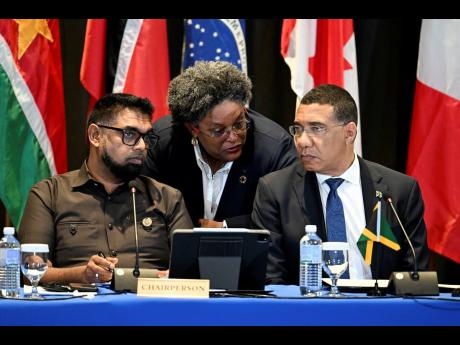Editorial | Haiti’s workable regime
The devil, as they say, is always in the details. Which is why the assembly of the many critical moving parts to the stability regime for Haiti, which was announced by Caribbean Community (CARICOM) leaders on Monday, will be closely monitored.
But on its face the proposed model appears to be a potentially workable solution, even over the long term, to Haiti’s chronic crisis of governance, fuelled by distrust among the country’s political elite. As such, the regime should be seriously considered as a part of an overhaul of Haiti’s constitution, during this period of reform. Hopefully, the parties to the agreement will implement it in short order.
With long overdue legislative elections, and a dispute over when his term should end, Haiti was plunged deeper into instability two-and-half years ago with the assassination of President Jovenel Moïse, in an apparent power grab by political figures in, and outside, Haiti.
In the chaotic aftermath of Mr Moïse’s murder, Dr Ariel Henry’s claim to the prime ministership, as a prior decision of President Moïse, was endorsed by the international community, with the imprimatur of the United States. Dr Henry, however, failed to win broad support among Haitians and his authority became increasingly tenuous as the security situation declined and power of criminal gangs spiralled in the capital, Port au Prince, and elsewhere in the country.
With a weak and ineffective Haitian national police, nearly 5,000 people were killed in gang-perpetrated violence last year and more than 1,000 others have died since the start of 2024. The gangs have also kidnapped people for ransom as well as blockaded the capital’s ports, making the delivery of humanitarian aid difficult.
A security mission to Haiti (sanctioned, but not led by the United Nations) to neutralise the gangs has been in limbo for several months, partly because of the failure of Haiti’s political groups, despite the coaxing of the CARICOM Eminent Persons Group (EMG) of three former prime ministers, which were slow in agreeing on a transitional/power-sharing arrangement.
That problem was also exacerbated by a ruling by Kenya’s High Court that President William Ruto’s undertaking to deploy 1,000 police officers to Haiti as part of Nairobi’s leadership of the international force, would be unconstitutional in the absence of a formal agreement between the two countries on police exchanges and cooperation in law enforcement.
NINE-MEMBER PRESIDENTIAL COUNCIL
Having attended a meeting of CARICOM leaders in Guyana where he came under pressure to make clear that he was committed to early election and was willing to stand down as prime minister, Dr Henry was in Kenya last week, apparently to firm up policing agreement, when a coalition of gangs, led by a former policeman, Jimmy ‘Barbecue’ Chérizier, attacked government institutions and buildings, including the airport, as well as orchestrated massive prison breaks. The gang leader also insisted on Prime Minister Henry’s resignation and insisted that he wouldn’t be allowed to return to the country.
The further, and rapid, deterioration of the situation served to concentrate minds, leading to Monday’s emergency meeting of CARICOM leaders and their international partners in Kingston, Dr Henry’s resignation and the political structure to govern Haiti during a transitional period, ahead of the assembly and presidential elections.
At the heart of the arrangement will be a nine-member Presidential Council with seven voting members, representing six political organisations, plus the private sector. The two non-voting members will be one representing civil society groups and the other from interfaith organisations.
This council will appoint an interim prime minister and, with the prime minister, appoint portfolio ministers.
In essence, the council will be a collective of equals, who, according to CARICOM’s declaration, will co-sign the orders, decrees and sign off on the agenda of the council of ministers.
Among its other priority tasks are to prepare for elections, including a new provisional electoral council, and collaborate with international partners for the deployment of the security force.
A COLLECTIVE EXERCISE OF AUTHORITY
The regime, broadly, resembles Switzerland’s Federal Council with its annual rotating presidency or the arrangement that worked reasonably well in post-Tito Yugoslavia, before the implosion of ethnonationalism heralded the break-up of the country.
Significantly, a joint presidency, with a rotating chairman, has survived in Bosnia and Herzegovina, one of the countries to emerge from the Balkan wars.
Haiti’s transition presidential council also has echoes of Northern Ireland’s power sharing between the first minister and deputy first minister, who, despite the nomenclature, have almost equal powers.
Given Haiti’s long history of dictatorship and majoritarian political exclusionism, the country’s elites and various stakeholders haven’t learned to trust each other with political powers. The upshot: institutions of governance and government, whose foundation is trust that declared obligations will be adhered to, are malformed and maladaptive. They quickly break when stressed.
In the circumstances, a collective exercise of authority may be one way to limit the concentration of power in a single individual.
The national assembly, as is the case in Switzerland, could choose the presidency, whose chairmanship would rotate on a fixed basis, over its term. Such a system would, however, require significant adjustment to Haiti’s existing Constitution, which ought to be on the agenda.
In the meantime, what is urgent is to bring stability to Haiti and reduce the suffering of its people.
As President Irfaan Ali of Guyana put it, what was achieved on Monday was “one step forward among many long steps ahead of us”.

